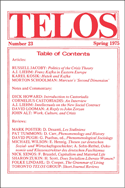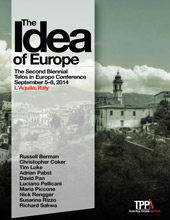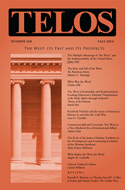By Telos Press · Wednesday, September 24, 2014 On February 14–15, 2015, the Telos-Paul Piccone Institute will hold its annual conference in New York City. The theme of the conference will be “Universal History, Philosophical History, and the Fate of Humanity.” The deadline for abstract submissions has been extended until October 20, so if you missed last week’s deadline but still wish to present a paper, send your abstract (no more than 250 words) and a short c.v. to telosnyc@telosinstitute.net and place “The 2015 Telos Conference” in the email’s subject line. For the full call for papers and other details about the conference, please visit the conference page at the Telos-Paul Piccone Institute website.
Continue reading →
By The Telos-Paul Piccone Institute · Tuesday, September 23, 2014 Earlier this month, the Telos-Paul Piccone Institute hosted its second Telos in Europe conference, focusing on “The Idea of Europe,” in L’Aquila, Italy, and we will be posting a number of papers from the conference in the coming weeks on this blog. In the meantime, we would like to take a moment to share with you the Institute’s mission, activities, and goals. You can help support the ongoing scholarly work of this non-profit organization by making a tax-deductible donation at the Telos-Paul Piccone Institute website.
Continue reading →
By Telos Press · Friday, September 19, 2014 Writing at the Financial Times today, Daniel Ben-Ami reviews Joel Kotkin’s The New Class Conflict, now available from Telos Press. Save 30% when you order your copy in our online store.
 Any serious attempt to understand the US’s current impasse by moving outside the conventional framework should be welcome. The stale pairings of liberal and conservative, right and left, no longer cut it. Any serious attempt to understand the US’s current impasse by moving outside the conventional framework should be welcome. The stale pairings of liberal and conservative, right and left, no longer cut it.
Joel Kotkin, an American academic and author, has come up with the unlikely proposal of understanding the country’s predicament in terms of class conflict. But his conception is a world away from the old socialist notion of a combative proletariat battling against an intransigent ruling class. Instead, his is an innovative attempt to rethink the main contours of US society.
Continue reading →
By Johanna K. Schenner · Wednesday, September 17, 2014  In “Franz Kafka in Eastern Europe,” Antonin J. Liehm addresses the impact of Kafka on both the communist literary sphere and the regime following the May 1963 Liblice Conference, an international symposium dealing with Kafka’s life and work. At first glance, this symposium does not appear to be remarkable: Kafka, known for such works as “The Metamorphosis” (1915) and “The Castle” (1926), was born in Prague in 1883, and he worked there as a lawyer before dying in 1924 in the sanatorium at Kierling, located in Klosterneuburg, Austria. Nonetheless, the symposium revealed that the socialist regimes were less totalitarian than supposed, if only for a short time, and it also attributed to Kafka a significant role in the beginning of cultural democratization, which then spread to other spheres. In “Franz Kafka in Eastern Europe,” Antonin J. Liehm addresses the impact of Kafka on both the communist literary sphere and the regime following the May 1963 Liblice Conference, an international symposium dealing with Kafka’s life and work. At first glance, this symposium does not appear to be remarkable: Kafka, known for such works as “The Metamorphosis” (1915) and “The Castle” (1926), was born in Prague in 1883, and he worked there as a lawyer before dying in 1924 in the sanatorium at Kierling, located in Klosterneuburg, Austria. Nonetheless, the symposium revealed that the socialist regimes were less totalitarian than supposed, if only for a short time, and it also attributed to Kafka a significant role in the beginning of cultural democratization, which then spread to other spheres.
Continue reading →
By Richard Sakwa · Monday, September 15, 2014 The following paper was presented at the recent Telos in Europe conference on “The Idea of Europe,” held in L’Aquila, Italy, on September 5–8, 2014.
 The Ukraine crisis reflected the continuation in new forms of what used to be called the East-West conflict. After the end of the Cold War in 1989–91, as a result of Mikhail Gorbachev’s attempt to reform the Soviet Union based on the ideas of the “new political thinking,” no inclusive and equitable peace system was established. Instead, an asymmetrical peace was imposed on Russia. The Soviet Union disintegrated in December 1991, and Russia emerged as the “continuer state,” assuming the burdens, treaty obligations, and nuclear responsibilities of the former USSR. As far as Russia was concerned, the end of the Cold War had been a shared victory: everyone stood to gain from the end of the division of Europe, symbolized by the fall of the Berlin Wall in November 1989. The institutions of the Cold War in the East were dismantled, above all the Warsaw Treaty Organization (the Warsaw Pact), but on the other side the organizations of the Cold War were extended, above all in the form of the North Atlantic Treaty Organization (NATO). The Ukraine crisis reflected the continuation in new forms of what used to be called the East-West conflict. After the end of the Cold War in 1989–91, as a result of Mikhail Gorbachev’s attempt to reform the Soviet Union based on the ideas of the “new political thinking,” no inclusive and equitable peace system was established. Instead, an asymmetrical peace was imposed on Russia. The Soviet Union disintegrated in December 1991, and Russia emerged as the “continuer state,” assuming the burdens, treaty obligations, and nuclear responsibilities of the former USSR. As far as Russia was concerned, the end of the Cold War had been a shared victory: everyone stood to gain from the end of the division of Europe, symbolized by the fall of the Berlin Wall in November 1989. The institutions of the Cold War in the East were dismantled, above all the Warsaw Treaty Organization (the Warsaw Pact), but on the other side the organizations of the Cold War were extended, above all in the form of the North Atlantic Treaty Organization (NATO).
Continue reading →
By Russell A. Berman · Monday, September 15, 2014 Telos 168 (Fall 2014) is now available for purchase in our store.
 This special issue of Telos investigates the concept of the West. Far more than a geographical term, in intellectual, philosophical, and cultural history, it has been common to speak of a Western tradition in order to name lineages of thought from antiquity to the modern world. In cultural and political debates, Western values are invoked that are linked historically to a deep tradition specifically dedicated to desiderata such as freedom and individual dignity: at stake is the general possibility of any long-term tradition, the durability of culture over time, but also this very specific, distinctively Western tradition as the carrier of particular values. Politically this usage explains the reference to Western democracies (as opposed to the “peoples’ democracies” of the Soviet era) with the suggestion that democratic political forms and norms have emerged from the “Western tradition” and have generated the institutions of both liberal democracy, i.e., democratic procedures that assert popular sovereignty, while simultaneously protecting individual rights, and market economies shaped by the rule of law and the protection of private property. This special issue of Telos investigates the concept of the West. Far more than a geographical term, in intellectual, philosophical, and cultural history, it has been common to speak of a Western tradition in order to name lineages of thought from antiquity to the modern world. In cultural and political debates, Western values are invoked that are linked historically to a deep tradition specifically dedicated to desiderata such as freedom and individual dignity: at stake is the general possibility of any long-term tradition, the durability of culture over time, but also this very specific, distinctively Western tradition as the carrier of particular values. Politically this usage explains the reference to Western democracies (as opposed to the “peoples’ democracies” of the Soviet era) with the suggestion that democratic political forms and norms have emerged from the “Western tradition” and have generated the institutions of both liberal democracy, i.e., democratic procedures that assert popular sovereignty, while simultaneously protecting individual rights, and market economies shaped by the rule of law and the protection of private property.
Continue reading →
|
|

 In “Franz Kafka in Eastern Europe,” Antonin J. Liehm addresses the impact of Kafka on both the communist literary sphere and the regime following the May 1963 Liblice Conference, an international symposium dealing with Kafka’s life and work. At first glance, this symposium does not appear to be remarkable: Kafka, known for such works as “The Metamorphosis” (1915) and “The Castle” (1926), was born in Prague in 1883, and he worked there as a lawyer before dying in 1924 in the sanatorium at Kierling, located in Klosterneuburg, Austria. Nonetheless, the symposium revealed that the socialist regimes were less totalitarian than supposed, if only for a short time, and it also attributed to Kafka a significant role in the beginning of cultural democratization, which then spread to other spheres.
In “Franz Kafka in Eastern Europe,” Antonin J. Liehm addresses the impact of Kafka on both the communist literary sphere and the regime following the May 1963 Liblice Conference, an international symposium dealing with Kafka’s life and work. At first glance, this symposium does not appear to be remarkable: Kafka, known for such works as “The Metamorphosis” (1915) and “The Castle” (1926), was born in Prague in 1883, and he worked there as a lawyer before dying in 1924 in the sanatorium at Kierling, located in Klosterneuburg, Austria. Nonetheless, the symposium revealed that the socialist regimes were less totalitarian than supposed, if only for a short time, and it also attributed to Kafka a significant role in the beginning of cultural democratization, which then spread to other spheres.  The Ukraine crisis reflected the continuation in new forms of what used to be called the East-West conflict. After the end of the Cold War in 1989–91, as a result of Mikhail Gorbachev’s attempt to reform the Soviet Union based on the ideas of the “new political thinking,” no inclusive and equitable peace system was established. Instead, an asymmetrical peace was imposed on Russia. The Soviet Union disintegrated in December 1991, and Russia emerged as the “continuer state,” assuming the burdens, treaty obligations, and nuclear responsibilities of the former USSR. As far as Russia was concerned, the end of the Cold War had been a shared victory: everyone stood to gain from the end of the division of Europe, symbolized by the fall of the Berlin Wall in November 1989. The institutions of the Cold War in the East were dismantled, above all the Warsaw Treaty Organization (the Warsaw Pact), but on the other side the organizations of the Cold War were extended, above all in the form of the North Atlantic Treaty Organization (NATO).
The Ukraine crisis reflected the continuation in new forms of what used to be called the East-West conflict. After the end of the Cold War in 1989–91, as a result of Mikhail Gorbachev’s attempt to reform the Soviet Union based on the ideas of the “new political thinking,” no inclusive and equitable peace system was established. Instead, an asymmetrical peace was imposed on Russia. The Soviet Union disintegrated in December 1991, and Russia emerged as the “continuer state,” assuming the burdens, treaty obligations, and nuclear responsibilities of the former USSR. As far as Russia was concerned, the end of the Cold War had been a shared victory: everyone stood to gain from the end of the division of Europe, symbolized by the fall of the Berlin Wall in November 1989. The institutions of the Cold War in the East were dismantled, above all the Warsaw Treaty Organization (the Warsaw Pact), but on the other side the organizations of the Cold War were extended, above all in the form of the North Atlantic Treaty Organization (NATO).  This special issue of Telos investigates the concept of the West. Far more than a geographical term, in intellectual, philosophical, and cultural history, it has been common to speak of a Western tradition in order to name lineages of thought from antiquity to the modern world. In cultural and political debates, Western values are invoked that are linked historically to a deep tradition specifically dedicated to desiderata such as freedom and individual dignity: at stake is the general possibility of any long-term tradition, the durability of culture over time, but also this very specific, distinctively Western tradition as the carrier of particular values. Politically this usage explains the reference to Western democracies (as opposed to the “peoples’ democracies” of the Soviet era) with the suggestion that democratic political forms and norms have emerged from the “Western tradition” and have generated the institutions of both liberal democracy, i.e., democratic procedures that assert popular sovereignty, while simultaneously protecting individual rights, and market economies shaped by the rule of law and the protection of private property.
This special issue of Telos investigates the concept of the West. Far more than a geographical term, in intellectual, philosophical, and cultural history, it has been common to speak of a Western tradition in order to name lineages of thought from antiquity to the modern world. In cultural and political debates, Western values are invoked that are linked historically to a deep tradition specifically dedicated to desiderata such as freedom and individual dignity: at stake is the general possibility of any long-term tradition, the durability of culture over time, but also this very specific, distinctively Western tradition as the carrier of particular values. Politically this usage explains the reference to Western democracies (as opposed to the “peoples’ democracies” of the Soviet era) with the suggestion that democratic political forms and norms have emerged from the “Western tradition” and have generated the institutions of both liberal democracy, i.e., democratic procedures that assert popular sovereignty, while simultaneously protecting individual rights, and market economies shaped by the rule of law and the protection of private property. 

